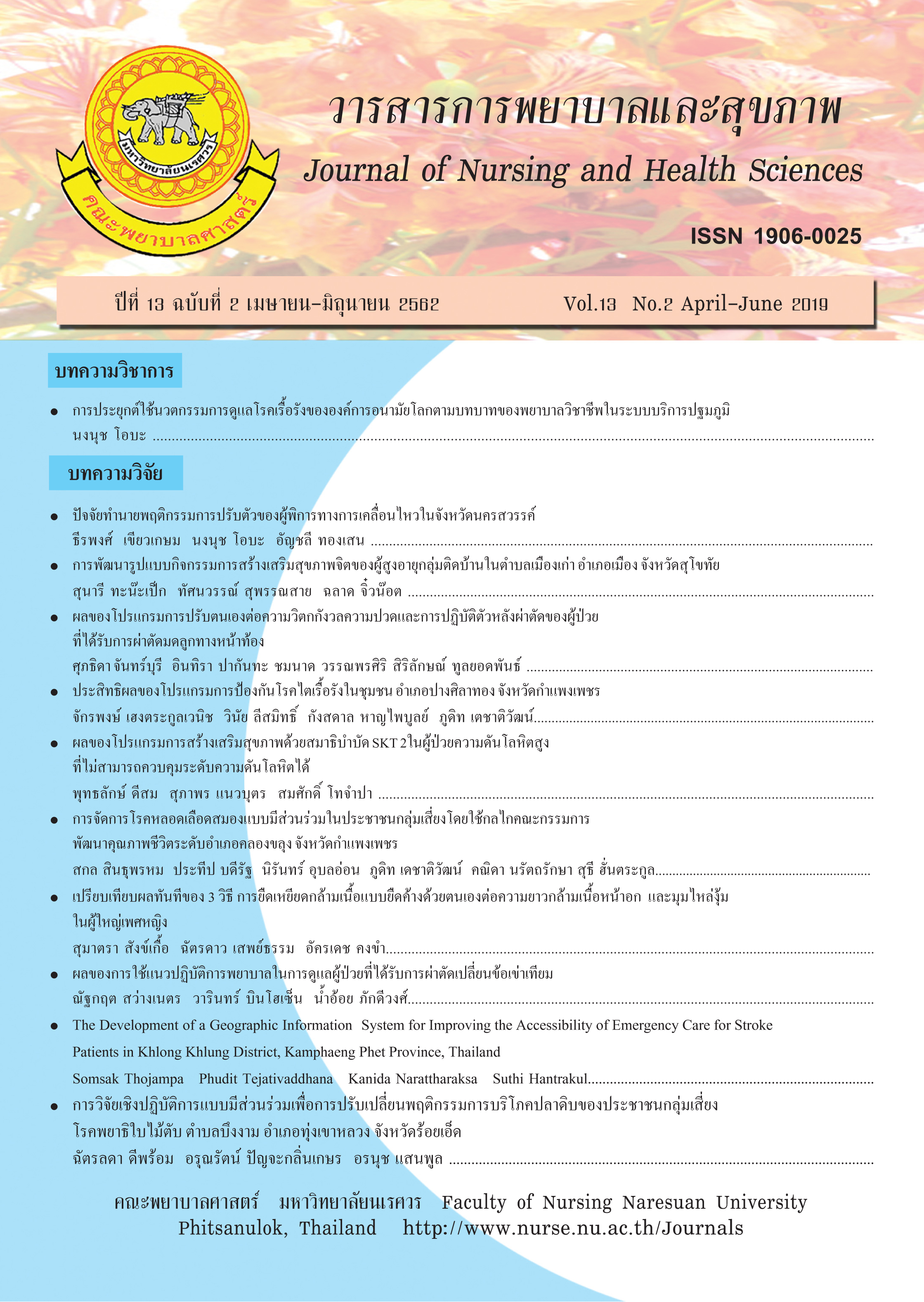The Development of a Geographic Information System for Improving the Accessibility of Emergency Care for Stroke Patients in Khlong Khlung District, Kamphaeng Phet Province, Thailand
Main Article Content
บทคัดย่อ
This action research aimed to develop a geographic information system to assist stroke patients and families in seeking emergency medical services (EMS) provided by hospitals and health care facilities. The geographic information system (GIS) in this studywas designed by practitioners, healthcare providers, community leaders, and village health volunteers. The developedsemi-structured questionnairewas verified by an expert panel before the effectiveness of this toolwas tested. Ten at-risk stroke patients simulated a pilot study by calling the EMS hotline to report a stroke emergency, and the nearby hospital dispatched ambulance to pick up the at-risk patient from their home. Outcomes were measured including practitioners' satisfaction towards using the developed GIS. The results showed that the pilot study that was simulated met the Khlong Khlung Hospital's goal. The ten at-risk- strokepatients that were delivered by EMS ambulance from their house to Khlong Khlung Hospital took less than two hours ( = 1.25 hour), starting from the time the hotline received calls. It was found that the community was satisfied with the GIS (Very good). The data collectionprocesses undertaken by the team included: analysis, planning and designing,reporting and presenting data. The system was found to be efficient inestablishing the implementation of a Stroke Patient EMS. It could be used as a guideline to establish the emergency medical services in addressing stroke as well as to increase participating medical facilities that are covered by Kamphaeng Phet province.
Article Details
เอกสารอ้างอิง
Bonita, R., Mendis, S., Truelsen, T., Bogousslavsky, J.,
Toole, J., & Yatsu, F. (2004).The global stroke
initiative. The Lancet Neurology,3(7), 391-393.
Boonchieng, E., Boonchieng, W., Senaratana, W., &
Singkaew, J. (2014).Development of mHealth
for public health information collection, with
GIS, using private cloud: A case study of Saraphi
district, Chiang Mai, Thailand. International
Computer Science and Engineering Conference
(ICSEC),350-353. [In Thai].
Ciliberti-Vargas, M. A., Gardener, H., Wang, K., Dong,
C., Yi, L., Romano, J. G., …Rundek, T. (2017).
Stroke Hospital characteristics in the Florida-
Puerto Rico collaboration to reduce stroke
disparities study. Southern medical journal, 110(7),
-475.
Di Carlo, A. (2009). Human and economic burden of
stroke. Age and Ageing,38(1), 4-5.
Feigin, V. L., Roth, G. A., Naghavi, M., Parmar, P.,
Krishnamurthi, R., Chugh, S.,...Estep, K. (2016).
Global burden of stroke and risk factors in 188
countries, during 1990-2013: a systematic
analysis for the Global Burden of Disease
Study 2013. The Lancet Neurology, 15(9), 913-924.
Giraldo, E. A. (2011).Overview of stroke (cerebrovas
cular accident).The Merck manual for health
care professionals.Retrieved 1 December
fromhttp://www.merckmanuals.com/
professional/sec17/ch221/ch221a.html.
Hackett, M. L., Yapa, C., Parag, V., & Anderson, C. S.
(2005). Frequency of depression after stroke: a
systematic review of observational studies.
Stroke, 36(6), 1330-1340.
Jirakajornkul, S. (2009).Learn Geometry with Arc
GIS Desktop 9.3.1: Textbook of Geography
Information 1. Nonthaburi: S.R. Printing Mass
Products Limited.[In Thai].
Kemmis, S., & McTaggart, R. (1992).The Action
Research Planner (3rd ed.). Geelong: Deakin
University Press.
Khlong Khlung Hospital. (2018). Statistic report of
Stroke: 2014-2016.Khong Khlung Hospital,
Kampaengphet Province. Kampaengphet:
Khlong Khlung Hospital. [In Thai].
Klawwikan, P., & Jirakajohnkool, S. (2014). Application
of Geographic Information Systems for Service
Area Analysis of Emergency Medical Service
Centers in Loei Province,Thai Journal of Science
and Technology, 3(3), 137-147. [In Thai].
National Highway Traffic Safety Administration.(2014).
Ministry of information and communication
technology communication. Bangkok: National
Highway Traffic Safety Administration.[In Thai].
Phinyo, K., Limtragool, P., Tiamkao, S., Worawong, C.,
Chuasuan, W., Aphiphatkan, W., … Sripromsa, W.
(2015). Care improvement for patients with stroke
through community participation. Songklanagarind
Journal of Nursing,35(2), 93-112.[In Thai].
Poungvarin,N. (2007). Burden of stroke in Thailand.
International Journal of Stroke,2(2),127-128.
Sacco, R. L., Benjamin, E. J., Broderick, J. P., Dyken,
M., Easton, J. D., Feinberg, W. M, …Wolf, P. A.
(1997). Risk factors.Stroke, 28(7), 1507-1517.
Saijo, Y., Yoshioka, E., Kawanishi, Y., Nakagi, Y.,
Hanley, S. J. & Yoshida, T. (2018). Relationships
between roaddistance to primary care facilities
and ischemic heart disease and stroke mortality
in Hokkaido, Japan: A Bayesian hierarchical
approach to ecological count data. Journal of
general and family medicine, 19(1), 4-8.
Sirilak, S.,Okanurak,K.,Wattanagoon,Y.,Chatchaiyalerk,
S.,Tornee, S.,Siri, S. (2013). Community participation
of cross border migrants for primary health
carein Thailand.Healthpolicyandplanning,28(6),
-664.
Suwanwela, N. C. (2014). Stroke Epidemiology in
Thailand, Journal of Stroke, 16(1), 1-7.
Venketasubramanian, N., Yoon, B. W., Pandian, J. &
Navarro, J. C. (2017).Stroke Epidemiology in
south, east, and south-east Asia: a review.Journal
of stroke, 19(3), 286-289.
Williams, D. R., Costa, M. V., Odunlami, A. O., &
Mohammed, S. A. (2008). Moving upstream:
how interventions that address the social
determinants of health can improve health
and reduce disparities.Journal of public health
management and practice: JPHMP, 14(8), 158-
World Health Organization. (2014).Community involvement
in Health.Retrieved 30 September 2015
fromhttp://www.afro.who.int/en/clustersaprogrammes/
hss/health-policya-service-.


